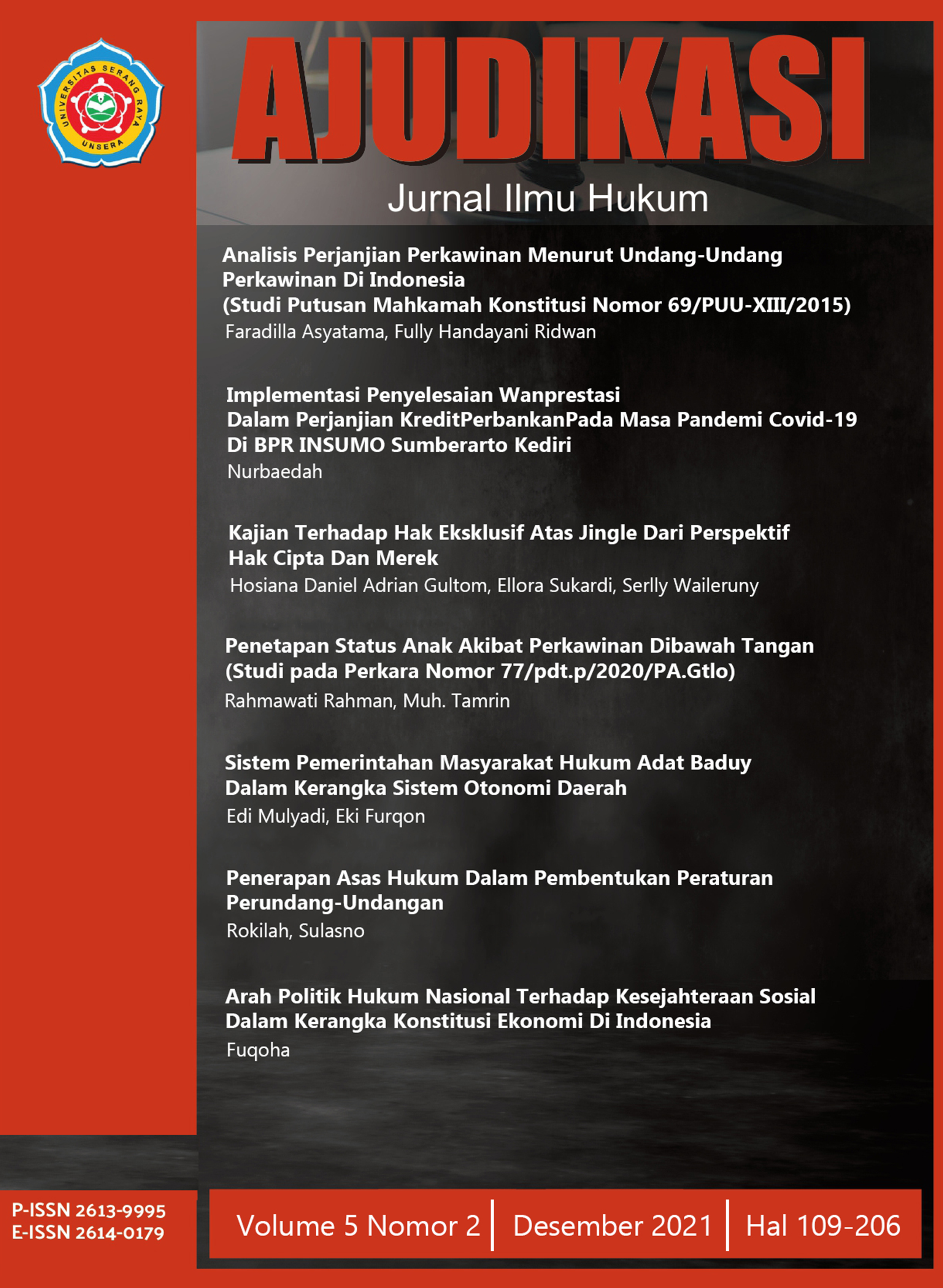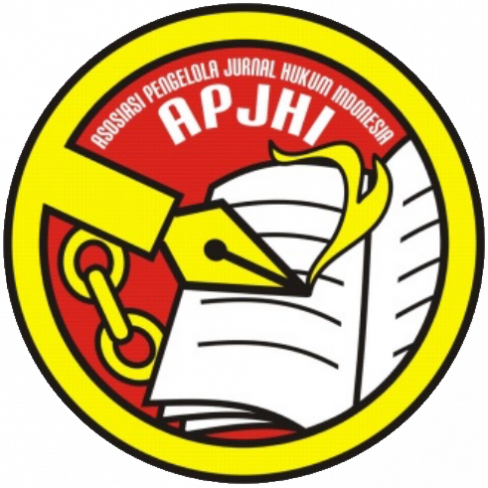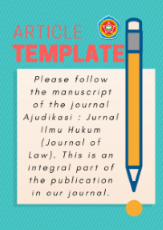Sistem Pemerintahan Masyarakat Hukum Adat Baduy Dalam Kerangka Sistem Otonomi Daerah
DOI:
https://doi.org/10.30656/ajudikasi.v5i2.3536Keywords:
Baduy, Customary law, Government SystemAbstract
Customary law communities are the most important part of the history of the development of the Indonesian nation. The contribution given by the customary law community since ancient times has been very large for the development of human civilization, especially in the aspect of order that exists in customary law. The Baduy tribe is one of the customary law communities whose existence is still maintained to this day. The Baduy customary law community has a legal system including its government system which is the hallmark of indigenous peoples. In addition to using their customary government system, Baduy as well as part of the Unitary State of the Republic of Indonesia must participate in every national policy, especially in the area of ​​regional and village government. The recognition given by the 1945 Constitution of the Republic of Indonesia to indigenous peoples in Indonesia is the basis for the use of their respective customary law systems. Therefore, the researcher considers it necessary to conduct a study to see how the current system of governance of the Baduy customary law community is related to the existing positive law.
The research method used is a normative juridical and empirical (mixed) juridical research method to see how the normative arrangements regarding the position of the Baduy community government system are and can describe what the government system is like. The specific target to be achieved in this research is to contribute ideas to the local government and the Baduy indigenous people in terms of the position of the Baduy customary government system in terms of the existing positive law.
The results of the research carried out explain the Baduy customary law community uses a government system that originates from their customary law known as pikukuh or karuhun. Law 23/2014 on Regional Government gives authority to provincial and district governments to regulate the empowerment of indigenous peoples and the arrangement of customary villages through existing traditional institutions. This happens because community and village empowerment is included in the mandatory concurrent government affairs that are not related to basic services.
Downloads
References
Dinas Lingkungan Hidup dan Kehutanan Provinsi Banten. “Profil Masyarakat Hukum Adat Dan Kearifan Lokal Di Provinsi Banten (Kajian Kearifan Lokal Dalam Pelestarian Lingkungan Hidup Dan Hutan).†Serang, 2017.
Fajar, Mukti, and Yulianto Achmad. Dualisme Penelitian Hukum Normatif Dan Empiris. Yogyakarta: Pustaka Pelajar, 2010.
Hanafi, Imam. Nyorenag Alam Ka Tukang. Nyawang Anu Bakal Datang. Bogor: RMI – The Indonesian Institute for Forest and Environment., 2014.
Hazairin. Demokrasi Pancasila. Jakarta: Tintamas, 1970.
Makmur K, Ade, and Adi Purwanto. “Pamarentahan Baduy Di Desa Kanekes: Perspektif Kekerabatan.†Jurnal Sosiohumaniora 4, no. 2 (2002): 104–15.
Muhlisin, Helmy Faizi Bahrul Ulumi, and Ayatullah Humaeni. “Kebijakan Pemerintah Daerah Dalam Perlindungan Masyarakat Adat Di Provinsi Banten: Studi Kasus Masyarakat Adat Baduy Dan Citorek.†Jurnal Kebijakan Pembangunan Daerah 1, no. 1 (2017): 27–44.
Rusnandar, Nandang. Seba Dalam Tradisi Masyarakat Baduy Di Banten. Bandung: Badan Pelestarian Nilai Budaya, 2012.
Shuida, Nyoman. Masyarakat Adat Dalam Pusaran Perubahan. Jakarta: Kemenko Bidang Pembangunan Manusia & Kebudayaan, 2016.
Sugiswati, B. “Perlindungan Hukum Terhadap Eksistensi Masyarakat Adat Di Indonesia.†Perspektif 17, no. 1 (2012): 31–43.
Downloads
Published
Issue
Section
License
Authors who publish with this journal agree to the following terms:
Authors retain copyright and grant the journal right of first publication with the work simultaneously licensed under a Creative Commons Attribution License that allows others to share the work with an acknowledgment of the work's authorship and initial publication in this journal.
Authors can enter into separate, additional contractual arrangements for the non-exclusive distribution of the journal's published version of the work (e.g., post it to an institutional repository or publish it in a book) with an acknowledgment of its initial publication in this journal.
Authors are permitted and encouraged to post their work online (e.g., in institutional repositories or on their website) before and during the submission process, as it can lead to productive exchanges and earlier and greater citation of published work.
All articles in Ajudikasi : Jurnal Ilmu Hukum can be disseminated provided they include the identity of the article and the source of the article (Ajudikasi : Jurnal Ilmu Hukum). The publisher is not responsible for the contents of the article. The content of the article is the sole responsibility of the author
Ajudikasi : Jurnal Ilmu Hukum is lincensed under a Creative Commons Attribution-ShareAlike 4.0 International License.










1.png)
.png)
.png)





.png)
.png)
.png)
.png)





.png)







